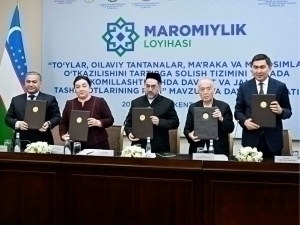Copyright qalampir

A new 90-day program has been launched in Uzbekistan to curb extravagance in weddings and ceremonies and to promote moral conduct and national values. The initiative was announced by the Republican Center for Spirituality and Enlightenment. According to the Center, the campaign aims to widely promote a culture of moderation in society, encouraging citizens to observe balance, avoid wastefulness, and embrace values such as gratitude and generosity as guiding principles in life. The initiative is expected to help strengthen harmony, solidarity, and moral stability across the country. To achieve these goals, the Republican Center for Spirituality and Enlightenment, together with the Association of Mahallas of Uzbekistan, the Committee on Religious Affairs, the Muslim Board of Uzbekistan, the Committee on Family and Women, the ’’Nuroni’’ Foundation, and other relevant organizations, have developed a set of measures to promote moderation through spiritual and educational outreach. As part of the plan, a 90-day campaign period has been designated for intensified awareness activities. Otabek Khasanov, head of the Republican Center for Spirituality and Enlightenment, noted that in some families, money accumulated over many years of hardship is being spent in a single day on lavish weddings and ceremonies in pursuit of ’’reputation’’ or ’’prestige,’’ and such cases have been rising sharply in recent times. ’’Another concerning trend is that people are increasingly taking out loans not out of necessity, but to maintain social status or avoid falling behind others,’’ said Khasanov. ’’As a result, many young families begin their married life in debt. This not only creates financial strain but also psychological pressure, often leading to family conflicts, early divorces, and other unfortunate outcomes.’’ According to Kahramon Qurbonboev, Chairman of the Association of Mahallas of Uzbekistan, the main goal of this program is to strengthen the culture of simplicity, modesty, and gratitude among the population, and to make it customary to hold weddings and ceremonies in accordance with national values, free from excessive extravagance. He added that the initiative also aims to prevent families from falling into unnecessary debt, promote financial literacy among young people, and encourage compact, sincere, and meaningful celebrations. The program seeks to widely promote the idea that ’’Simplicity is culture’’ within communities. It was reported that the program’s activities will be carried out in three main areas: organizational, traditional, and digital promotion. On September 14, 2019, the Councils of the Legislative Chamber and the Senate of the Oliy Majlis of Uzbekistan adopted a joint resolution titled ’’On further improving the system of regulating weddings, family celebrations, and ceremonies.’’ The resolution approved a regulation that sets the framework for organizing weddings and family events, including a specific clause prohibiting vanity, extravagance, and wastefulness. Nevertheless, lavish weddings remain common practice in the country, with some officials themselves often setting an example of excess rather than restraint. Furthermore, the Presidential decree ’’On measures to effectively organize the implementation of priority tasks for further improving the system of combating corruption,’’ adopted on April 21 of this year, also called for the development of a draft law aimed at regulating weddings in Uzbekistan. According to the government’s resolution adopted on September 16, 2025, titled ’’On measures to effectively utilize food waste generated in public catering enterprises, reduce their negative impact on the environment, and prevent excessive waste,’’ the years 2026–2030 have been declared the ’’Period of urgent food security.’’ During this period, systemic measures will be implemented to ensure a sufficient and high-quality food supply for the population while minimizing unnecessary waste. The resolution also approved an action plan for implementing the ’’Rational consumption’’ program. According to the plan, weddings, family celebrations, and ceremonies must be organized in accordance with the regulation approved by the joint resolution of the Councils of the Legislative Chamber and Senate of the Oliy Majlis on September 14, 2019. Under this regulation, family events may host up to 200 guests, while accompanying osh (pilaf) gatherings may include up to 250 participants. For joint weddings and community events (hashar), the number of attendees should not exceed 250 guests, and their related osh gatherings may host no more than 300 participants. The regulation also prohibits additional customs and entertainment practices that are alien to national traditions, contradict moral standards, or demand excessive time and expense. These include customs such as “kuyov navkari” (the groom’s escort), “chorlar” (traditional calls or summons), “ota ko‘rdi” (father’s visit), “sep yoydi” (dowry display), “quda chaqirdi” (inviting in-laws), “kuyov chaqirdi”, “kelin chaqirdi” (groom’s or bride’s invitation ceremonies), and “tog‘ora yuborish” (sending gift trays). Likewise, extended rituals connected to funerals and mourning — such as “etti” (the seventh day), “payshanbalik”, “yakshanbalik”, “yigirma” (the twentieth day), “qirq” (the fortieth day), “hayit”, “yil oshi” (memorial meal after one year), as well as the distribution of money or cloth — are also strictly prohibited.



